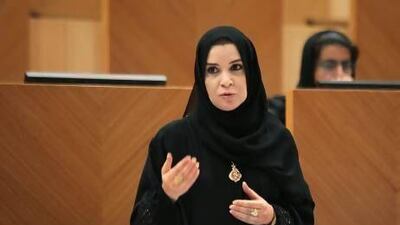ABU DHABI // A member of the FNC has called for free treatment for all Emirati and expatriate children born in the UAE with Down syndrome.
Dr Amal Al Qubaisi (Abu Dhabi), the deputy speaker, painted a grim picture of the state of aid given to families with Down syndrome children.
She said a study found that the genetic disorder, which causes a delay in mental and psychical development, affects one in every 319 babies born in the UAE – double the world average.
Dr Abdul Rahman Al Owais, the Minister of Health, agreed that the statistics were worrying. He said factors such as pregnancies after the age of 35 and multiple births were common practices in the country, and increased the risk of Down syndrome. Not eating properly during pregnancy was another risk factor, he said.
“In regards to what the member mentioned, it is true the statistics are high,” he said. “They are worrying, but if we talk about the GCC or Arab countries, the number is not far off.”
Dr Al Qubaisi said according to the study she had seen, conducted by the Centre for Arab Genomic Studies – a division of the Sheikh Hamdan bin Rashid Al Maktoum Award for Medical Sciences – this was not true.
She said it found that in Oman, one birth in every 500 was a Down syndrome child. In Saudi it is one in 546 and in Kuwait one in 581.
The minister gave different statistics. He said in Kuwait, the rate was one in 350 births, and in Saudi, one in 427.
He also said that only 20 per cent of cases were found to be because the mother was more than 35, so age was not as big a factor as believed.
Dr Al Owais said the ministry provided premarital genetic testing and checks during the first three months of pregnancy. Prenatal vitamins were also dispensed.
He said that despite the ministry offering these services, not all mothers took advantage of them.
“Unfortunately, there is no other way of checking,” he said.
“We cannot force them to take these and unfortunately a lot of mothers do not follow pregnancy plans or what medication to take.”
Dr Al Qubaisi said early intervention and support following a Down syndrome birth were vital, and that there was a shortage of care facilities for such children.
“A lot want to go to theses centres, but there aren’t enough spaces for them,” she said. “Whether for locals or not. This is a humanitarian problem. Parents also need social support to deal with their children.”
Dr Al Owais agreed that his ministry should work with the Ministry of Social Affairs to spread awareness of the issue.
Dr Al Qubaisi said it was necessary to help families as early as possible.
“We must have specialised centres for Down’s syndrome and early intervention is needed – and free treatment.”
She said that insurance companies charged higher rates to cover children with Down syndrome and that mothers of those children often suffered from depression because they had no support or education on dealing with them.
Dr Al Qubaisi said doctors must be trained on how to deal with these patients and how to pass the news to the parents that their children are affected.

